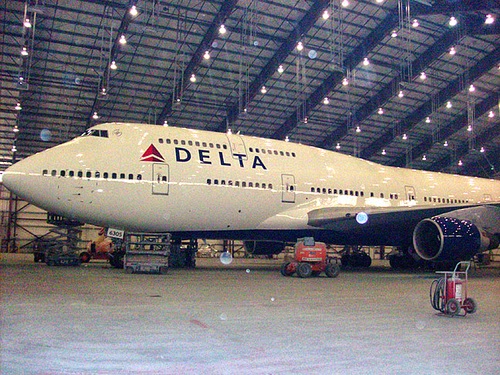If you want to book a flight on one of Delta Air Lines' Boeing 747s, the clock is ticking.
The carrier plans to retire the last of the 16 747s in its fleet by 2017, CEO Richard Anderson said during the carrier's third-quarter earnings call Thursday.
The move is no surprise, but the timeline guidance comes as Delta says in its earnings statement that it will "accelerate the retirement of (its) 747 fleet as part of its Pacific network restructuring."
Delta President Ed Bastian, speaking on the same call as Anderson, said Delta's accelerated phase-out of the 747s comes as the company shifts some of its capacity on trans-Atlantic flights to routes between the USA and Asia.
Bastian added that Delta's acquisition of Airbus 330s next year will help facilitate retirement of 747s.
More broadly, the move comes as industry analysts speculate that the 747's days could be numbered and that Boeing will likely have to end production of its iconic jumbo jet sooner rather than later.
Boeing's latest model of the 747 — the 747-8 Intercontinental — is its biggest and most technologically advanced passenger version of the jet. But, so far, sales of the plane have been tepid.
Lufthansa was the launch customer of the latest version of the jet, and recently took delivery of the milestone 1,500th 747 ever produced. Air China became the second airline to take delivery of the new 747-8i last month. But, outside those carriers, Korean Air and Russian carrier Transaero are the only other passenger airlines with orders for the aircraft.
As of late June, the number of 747s coming off Boeing's production line north of Seattle is just 1.5 per month — down from about six per month in 1990. And airlines that have older 747s in their fleets are phasing out the planes at an increasingly brisk clip.
Air New Zealand, for example, flew its final Boeing 747 flight in September, opting to replace the aircraft with Boeing's 787 and 777 models.
That matches a trend in which airlines have shown an increasing preference for two-engine widebody jets — like the Airbus A330 and Boeing's own 777 — that seat fewer people, but burn less fuel and can fly comparable distances.
Still, Boeing officials remain steadfast that the 747 has a solid future ahead of it.
"There is still a fair amount of interest" from airlines, Eric Lindblad, vice president and general manager of Boeing's 747 program, told Today in the Sky in June. "Enough that we're going to sit here today and say we expect we're going to be building the 747-8 for quite a bit longer."
The carrier plans to retire the last of the 16 747s in its fleet by 2017, CEO Richard Anderson said during the carrier's third-quarter earnings call Thursday.
The move is no surprise, but the timeline guidance comes as Delta says in its earnings statement that it will "accelerate the retirement of (its) 747 fleet as part of its Pacific network restructuring."
Bastian added that Delta's acquisition of Airbus 330s next year will help facilitate retirement of 747s.
More broadly, the move comes as industry analysts speculate that the 747's days could be numbered and that Boeing will likely have to end production of its iconic jumbo jet sooner rather than later.
Boeing's latest model of the 747 — the 747-8 Intercontinental — is its biggest and most technologically advanced passenger version of the jet. But, so far, sales of the plane have been tepid.
As of late June, the number of 747s coming off Boeing's production line north of Seattle is just 1.5 per month — down from about six per month in 1990. And airlines that have older 747s in their fleets are phasing out the planes at an increasingly brisk clip.
Air New Zealand, for example, flew its final Boeing 747 flight in September, opting to replace the aircraft with Boeing's 787 and 777 models.
That matches a trend in which airlines have shown an increasing preference for two-engine widebody jets — like the Airbus A330 and Boeing's own 777 — that seat fewer people, but burn less fuel and can fly comparable distances.
Still, Boeing officials remain steadfast that the 747 has a solid future ahead of it.
"There is still a fair amount of interest" from airlines, Eric Lindblad, vice president and general manager of Boeing's 747 program, told Today in the Sky in June. "Enough that we're going to sit here today and say we expect we're going to be building the 747-8 for quite a bit longer."
